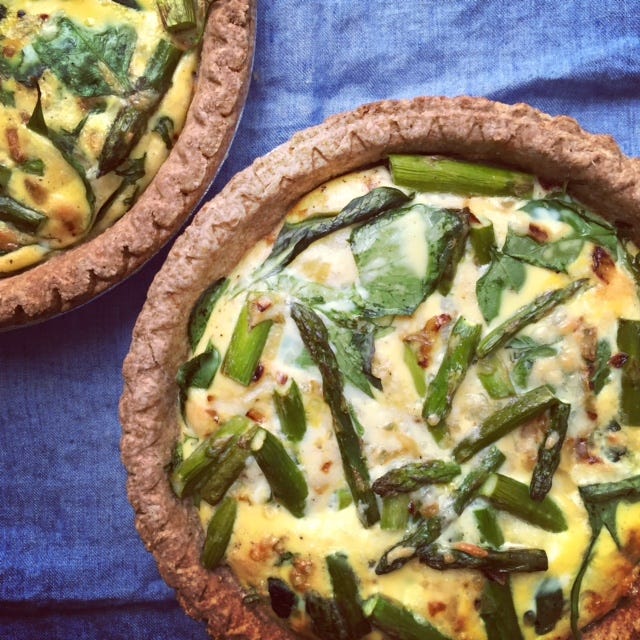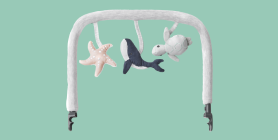
Oh, the joys of pregnancy! As soon as you announce your pregnancy, everyone under the sun, from your mother-in-law to your massage therapist, starts to pepper you with advice. A lot of is helpful, but some of it is downright wrong, especially as it relates to what to eat to fuel your growing baby. Here’s a no-nonsense list of foods that are packed with the essential nutrients your little one needs for healthy growth and development. Time to eat up momma!
Avocado
If you've been plagued by leg cramps during your pregnancy, it's time to get more avocado. Half of this creamy, delicious fruit contains 345mg of potassium, 114 calories, and nearly 5g of fiber. A lack of potassium can cause leg muscles to cramp. During pregnancy you need 4700mg daily of the mineral, which sounds like a shocking amount, but most fruits and vegetables contain at least some potassium. If you’re breastfeeding, that amount jumps to 5100mg per day, so it’s smart to get used to packing lots of this important electrolyte into your diet. The ever-popular avocado toast is a delicious way to start your day. Change it up by topping the avocado with fresh fruit, spice mixes like za’atar, and baby kale.
Canned tuna
You know that omega-3 fatty acids are so important for your baby’s developing brain, but you might be confused about the best way to get those important fats. Unfortunately, lots of pregnant women have gotten the wrong message about seafood, thinking that it’s not safe to eat during pregnancy, which has translated to pregnant women eating just ¼ of the recommended amount of seafood per week. The DHA omega-3s found in fatty fish are essential to the healthy development of a growing baby’s brain and nervous system, especially during the last trimester. In fact, a recent study in Nutrition Journal reported that moms-to-be who eat two seafood meals per week can boost their baby’s IQ by an extra 3.3 points by age 9. And moms--it’s also important to get enough for your own health--omega-3 deficiency increases your risk of experiencing depression. The good news is that it’s actually easy to get the recommended 8-12 ounces of seafood each week, especially when you keep canned tuna on hand. Bumble Bee’s Omega-3 Albacore Tuna packs in extra omegas for a total of 500mg of EPA and DHA combined in each 2-ounce serving. The recommended daily intake of DHA during pregnancy is 300mg. Tuna sandwiches are delicious of course, but tuna is also tasty mixed with fresh lemon juice, chopped parsley, chopped olives and some extra virgin olive oil. You can use this satisfying and healthy mixture to top an arugula salad, or serve it on whole grain toast or crackers. I also love tossing tuna with pasta and steamed veggies with some olive oil, salt and pepper and a squeeze of lemon--delicious!
Yogurt
It’s time to bone up mommas! Calcium is essential for building baby’s bones and teeth. This mineral is found in milk, yogurt, cheese, spinach, broccoli and almonds. Most women don’t get enough (we need 1000mg daily), so make an effort to add a few extra servings each day. If you don’t get enough from your diet, baby will borrow calcium from your bones and teeth (yikes!), which can leave you with brittle bones down the road. There are many reasons why Greek yogurt has become the star of the dairy aisle. It's loaded with protein (because it requires twice as much milk to make), boasting about 14g of protein per 5.3-ounce cup. It also contains probiotics, which help to maintain a healthy digestive system. Additionally, it provides 15 percent of your daily calcium requirement, plus it has a smooth and creamy texture. Topping Greek yogurt with frozen wild blueberries adds 6g of fiber and only 80 calories, plus an antioxidant boost. Two tablespoons of chopped almonds add crunch and extra calcium, plus 90 calories, 4g protein, 1.5 g fiber, and healthy fats.
Eggs
You've probably been reading lots in the news about vitamin D. It's known as the trusty sidekick to calcium, helping the mineral get absorbed by the body. It's also been linked to preventing cancer, boosting immunity, reducing inflammation and improving mental health. During pregnancy, it's vital to get enough vitamin D to help support your baby's growing bones and teeth, and to make sure that her immune system functions properly once she leaves the womb. Pregnant women need 600 IU of vitamin D daily, but many experts recommend 1000 or more IU daily. Up to 4000 IU per day is safe, according to the Institute of Medicine. One egg serves up 20 IU of vitamin D. The vitamin D is in the egg yolk, so don't ditch it! Other good sources are fortified milk (98 IU per 8 ounces), salmon (360 IU per 3.5 ounces) and canned tuna (200 IU per 3 ounces). Egg yolks also contain choline, which is essential for your little one's developing brain and can help prevent birth defects. You need 450mg daily of choline and you can knock out 125 mg with just one egg. Luckily, there are hundreds of delicious ways to enjoy eggs! Just make sure to fully cook them to avoid food safety issues. When I was pregnant, I craved eggs every day and the quickest way to get one on my plate was to fry one up. I usually put it on top of a piece of whole grain bread, but I also loved serving them over whole grains, like farro. Ancient grains like farro and sorghum do take a while to cook, but once cooked, you can freeze them in airtight containers for up to three months. And of course, quinoa is another healthy, protein-rich whole grain that takes just 15-20 minutes to cook. Eggs are delicious on all of them--try a little salsa, sriracha or grated Parmesan cheese for an added flavor boost.
Oranges & Orange Juice
Folic acid is essential to the development of your baby’s spinal cord and spinal nerves. It’s key in preventing spina bifida and it’s important to get enough both before and during your pregnancy. You’re likely already taking a prenatal vitamin with folic acid, but you’ll also want to eat plenty of foods that are rich in this B vitamin too. The daily goal for folic acid is 600mcg (micrograms). Vitamin C is a powerful antioxidant and is important for the growth of new cells and your body is doing a ton of that right now. During pregnancy, you need 85mg of this important antioxidant and breastfeeding pushes the requirement up to 120mg. Lucky for you, oranges and OJ are a fantastic source of both folic acid and vitamin C, all in a delicious, refreshing package. One orange contains 48mcg of folic acid, plus 64mg of vitamin C. An 8-ounce glass of orange juice (which is equivalent to 2 oranges) covers your vitamin C needs for the day and boasts 80mcg of folic acid. Other fresh fruits and vegetables that are rich in vitamin C include bell peppers, strawberries, broccoli, kiwi and mango. Folic acid-rich foods also include fortified cereal and breads, lentils, edamame, spinach, asparagus and wheat germ.
Lean beef
Iron is necessary for the formation of red blood cells, which your body is busy making during pregnancy, as blood volume increases by a whopping 50 percent. Your daily requirement jumps from a doable 18mg per day pre-pregnancy to 27mg per day during pregnancy, which many women find daunting to get. Your prenatal vitamin will give you some iron, but what you eat is also essential for covering your needs. Not only do you need the extra iron to make all those new red blood cells, but baby also stores up on iron in the womb, which is super smart on his part because breast milk is low in iron. Iron efficiency anemia is very common during pregnancy and can leave you feeling sluggish (even more than usual) and out of breath. Dizziness and difficulty concentrating are other signs you could be anemic. You probably know that red meat is an excellent source of iron. Even women who have been vegan or vegetarian for years often experience such strong cravings for meat that they throw their dietary restrictions aside and tuck into a juicy beef burger. If you’re feeling like a cave girl, go for it! You can always return to your prior eating habits once baby enters the world. There are two different types of iron--heme and non-heme. Heme iron comes from animal sources and is easiest for your body to absorb. Non-heme iron comes from plants and our bodies aren’t as efficient at absorbing it, so you’ll need to eat more of it to get enough for your baby. In addition to beef and bison, which supply about 3g of iron per 4-ounce serving, you’ll also get plenty of this mineral in chicken, eggs, salmon, Swiss chard, and dried apricots. I know it seems like a lot is on your plate right now, but with a few tweaks, you can get your diet in ship shape and feel great about what you’re fueling your body and your baby with.
Emotional Benefits of Getting Outside
Spending time in nature with your baby can strengthen the bond between you. The simple act of holding your baby close, feeling their warmth, and sharing new experiences together can create strong emotional connections. It’s also a wonderful way to reduce stress and improve your mood. When my littles were extra fussy, I’d take a walk around the neighborhood. Even though I don't live in an area with trails and surrounded by nature, simply behind outside changed everything. A little vitamin D does wonders!
Cognitive Development
Nature is a sensory wonderland for babies. The different sights, sounds, and smells can stimulate your baby’s senses and promote cognitive development. Watching leaves rustle, hearing birds chirp, and feeling the texture of a tree bark can all contribute to their learning and development.
All About Baby Carriers for Nature Adventures
Choosing the Right Baby Carrier
When it comes to selecting the best baby carrier for summer adventures, there are several options to consider.
Types of Baby Carriers:
- Wraps: Perfect for newborns, providing a snug and secure fit.
- Slings: Ideal for quick and easy use, offering good ventilation.
- Soft Structured Carriers: Versatile and comfortable for both parent and baby, suitable for longer trips.
Factors to Consider:
- Baby’s Age and Weight: Ensure the carrier is appropriate for your baby’s size and weight. For example, Ergobaby’s Embrace Newborn Carrier is perfect for the fourth trimester where baby is small and you’re looking for an easy way to stay close. As they grow, you’ll want to upgrade to an all-position carrier that’s meant for growing babies.
- Parent’s Comfort and Ergonomics: Look for carriers with padded shoulder straps and lumbar support if you’re planning on longer outings.
- Ease of Use: Choose a carrier that is easy to put on and take off.
- Climate and Breathability: Opt for carriers made of breathable fabrics to keep you and your baby cool in hot weather.
Safety Tips:
- Proper Positioning: Ensure your baby is seated correctly, with their legs in an "M" position and their head should be close enough to kiss.
- Checking for Wear and Tear: Regularly inspect your carrier for any signs of damage.
- Ensuring Adequate Support: Make sure the carrier provides proper support for your baby’s head and neck.
Exploring Nature with a Baby Carrier
Ideal Spots for a Nature Walk with Baby
- Parks and Gardens: Great for leisurely walks and picnics.
- Nature Trails and Forests: Perfect for more adventurous outings.
- Beaches and Lakesides: Wonderful for enjoying the water and sand, with the right carrier.
Activity Ideas
- Hiking: Enjoy a scenic hike with a hiking baby carrier that offers support and storage.
- Bird Watching: Use your carrier to keep your baby close while you explore and observe wildlife.
- Picnics: A carrier can free up your hands, making it easier to carry picnic supplies.


Advantages of Using Strollers for Nature Adventures


While baby carriers are fantastic for mobility and closeness, depending on the adventure of choice you might want to be a stroller along too.
There are a LOT of baby stroller options on the market. So we understand how confusing it can be to choose the one that’s right for your family. Not only are there a variety of brands, but a variety of strollers that serve different purposes.
There are a few types of strollers on the market:
- Full-sized stroller: This is typically the stroller parents thing of buying for all its versatility.
- Lightweight or umbrella stroller:These compact strollers are perfect for on-the-go adventures.
- Jogging stroller: Designed for parents who want to combine fitness with outdoor adventures.
- Double stroller: Designed for parents with multiple kids, especially twins.
- Car seat carrier: These strollers connect to a specific car seat. We don't typically recommend these as they can be unsafe for baby and uncomfortable for parents who are pushing.
Learn more about the types of strollers and which one would be best for you.
Benefits of Bringing a Stroller
- Storage Space for Gear: Ample room for carrying all your essentials like a diaper bag, beach toys and more.
- Shade and Weather Protection: Built-in canopies to shield your baby from the sun when they are lounging.
- Options: If you have more than one kid, you can stroll with one and carry the other. Or, if you’re getting warm or your little one is getting fussy, you can switch up their position from stroller to carrier or vice versa.
Safety Tips for Strollers
- Ensure your stroller is in good working condition. Make sure buckles are still buckling and that there are no rips or holes that could compromise your baby’s safety.
- Use sunshades or bug nets to protect your little one’s skin.
- Securing the baby properly: always buckle up your baby for safety even if you think they are old enough to go without the buckle.
Combining Baby Carriers and Strollers
For the ultimate flexibility, consider using both a baby carrier and a stroller on your outings.
Combining both options allows you to adapt to different situations. Use the carrier for more rugged trails and switch to the stroller for smoother paths or when your baby needs a nap.
Transition Tips
- Smooth Transitions: Plan stops where you can easily switch from carrier to stroller.
- Pack Light: Only bring essentials to make transitions easier.
Tips for a Successful Adventure
Planning Ahead
- Route Planning: Choose baby-friendly trails and parks. Check local mom groups or outdoor groups and get recommendations for the best outings for kids.
- Check Weather Conditions: Avoid extreme heat or unpredictable weather. Even with our most breathable carriers, when it’s hot, it’s hot. And having two bodies against each other in the heat will be naturally hot and sticky already.
- Packing Checklist: Include diapers, snacks, water, sunscreen, and a first-aid kit. These all-position carriers have storage pockets where you can fit some of the items easily!
- Stay Hydrated and Nourished: Pack healthy snacks to keep energy levels up and bring plenty of water for both you and baby.


Summer adventures with your baby are a wonderful way to create lasting memories and enjoy the beauty of nature together. From baby carriers to strollers, Ergobaby products are designed to provide comfort and ease for both you and your little one. So, gear up, get outside, and explore the world with your baby by your side.
Ready to embark on your own summer adventures? Check out Ergobaby’s range of baby carriers and strollers to find the perfect match for your family’s needs. Visit our website today and start planning your next outdoor excursion!



























